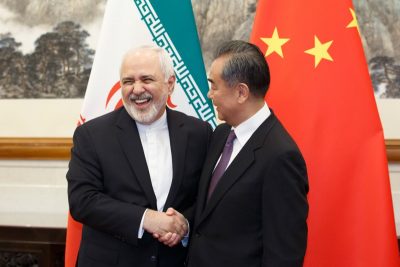Is China Planning on Blocking US Sanctions Imposed on Iran?

All Global Research articles can be read in 27 languages by activating the “Translate Website” drop down menu on the top banner of our home page (Desktop version).
***
According to some reports China has developed a ‘blocking statute’ to subvert US sanctions imposed on Iran. This follows President Joe Biden’s stance, which amounts to enforcing the policies of the previous US President, Donald Trump, against Iran.
In 2015, following intense negotiations between China, France, Russia, United Kingdom, the US, Germany, the European Union and Iran, a milestone agreement was concluded – the Joint Comprehensive Plan of Action (JCPOA) – commonly known as the ‘Iran Nuclear Deal’.
The deal was completed during the Obama administration and endorsed by UN Security Council Resolution 2231.
The deal restricts Iran’s nuclear activities. It allows Iran to be subject to rigorous and continuous monitoring by the UN watchdog, the International Atomic Energy Agency (IAEA) – allowing its inspectors to enter Iran to confirm full compliance with the nuclear-related provisions and requirements set in the deal. According to many reports the IAEA has devised the most intrusive international monitoring system specifically for Iran – and no other nation in history has ever been subject to such robust scrutiny.
In exchange for compliance, the other signatory nations to the ‘Iran Nuclear Deal’ are committed to lifting sanctions against Iran.
Despite Iran’s full compliance with the deal, as repeatedly confirmed by the IAEA, President Trump unilaterally withdrew the US from the deal on May 8, 2018, and subsequently re-imposed the US primary and secondary sanctions on Iran. Other signatories made strong declarations they would remain committed to the agreement, which raised harsh criticism from the Trump administration. US allies, including Israel, Saudi Arabia and Bahrain, welcomed the steps taken by the US to sabotage the deal.
In a National Security Presidential Memorandum, President Trump directed the Secretary of State and the Secretary of the Treasury to immediately take steps to reinstate US sanctions lifted or waived in connection with the ‘Iran Nuclear Deal’. The Trump administration would later implement further sanctions against Iran beyond the reinstated sanctions.
According to recent reports China has developed a potentially effective instrument, a ‘blocking statute’, which would allow China to do some trade with Iran and circumvent the US sanctions.
On January 9, 2021, China’s Ministry of Commerce – MOFCOM – issued its first order of the year, the ‘Rules on Counteracting Unjustified Extra-Territorial Application of Foreign Legislation and Other Measures’. These ‘rules’ are designed to counteract the impact of US secondary sanctions – and are similar to the EU’s Blocking Statute.
The EU’s Blocking Statute was first introduced in 1996 to counteract the US’s sanctions against Cuba, Iran and Libya at that time.
On 6 June 2018, the EU adopted a delegated act amending Regulation (EC) No 2271/96 of 22 November 1996 protecting against the effects of the extra-territorial application of legislation adopted by a third country, and actions based thereon or resulting therefrom (the Blocking Statute) in order to counteract the extra-territorial application of certain US sanctions in the EU.
However, the EU Blocking Statute has been considered a ‘toothless tool’, with limitations on the practical enforcement of it.
China has a different set of priorities with Iran, than the EU does with Iran.
The Chinese leadership has made clear Iran is a strategic partner as outlined in the 18-page document titled, ‘Iran-China Comprehensive Strategic Partnership’.
This concludes a long-term trade and military negotiations between China and Iran – and would see China invest $400 billion over the next 25 years in Iran. It would “vastly expand Chinese presence in banking, telecommunications, ports, railways and dozens of other projects” and allow China to receive Iranian oil at a reduced price in order to meet its growing energy needs. All of this will motivate China to ensure its own ‘blocking statute’ will be robust and achievable.
China needs Iran to advance its global ambitions – and ensuring the success of its ‘blocking statute’ will be a priority.
*
Note to readers: please click the share buttons above or below. Forward this article to your email lists. Crosspost on your blog site, internet forums. etc.
Shahbazz Afzal is an independent writer and political activist.
Featured image is from InfoBrics

